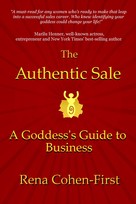There is a misconception that only a certain type of woman can be successful in sales. My goal is to show every woman that she can move from the supportive roles, considered more traditionally feminine, to the front lines in the sales force. What's more, that she can flourish there. I should know--I did it.
I was an awkward and bullied child with a nervous tic that led everyone in sixth grade to call me "Blinky." I was a troubled and rebellious teenager who barely graduated from high school. But after pursuing my first sales opportunity, I completed my degrees and eventually became a top seller for some of the largest nutritional ingredient manufacturers in the world. I have built emotional connections with several of the most influential brands, resulting in millions of dollars' worth of business for my employers. I have broken new ground for important and meaningful ingredients that have truly impacted consumer health and wellness. But it is all due to my ability to leverage my strengths and authentic style.
In my book, The Authentic Sale, A Goddess's Guide to Business, I speak about knowing which aspects of the (somewhat) universal sales process are your natural strength. Knowing your strength and then leading with them, will help you fortify all of the other components of the process by understanding which competencies to shore up, standardize or delegate.
For many of the behavioral types that you might see in the business world, I describe Greek Goddesses as metaphorical female business leaders. But the one archetype that I most closely align with in my sales profession is not female--it is the charming connector, Hermes. Hermes is the god of communication; he was the great connector of the underworld and the world of the gods.
Scripting
One of the most effective methods that I have ever used in selling has been scripting. It allows snippets of thought-out information to be at your fingertips and delivers a professional polish to any situation. All politicians use scripts, and despite the messages they are trying to convey, the conviction they speak with is always persuasive. Sales script expert Eric Lafholm advises to share the benefit of the benefit (the benefit they derive from the benefit you have just mentioned). In other words, in addition to stating that you are the largest widget manufacturer, you should also let them know that this means faster speed to market for them. If you are a financial planner using the latest technology, you should explain how that would mean the highest quality of service for them, which would save them a particular number of dollars. If you're an ingredient supplier, you might explain how your ingredient would extend their product's shelf life, saving them six months of inventory costs.
Value Proposition
Your value proposition is the communication of your organization's offering to customers, based on your strategy. The value proposition is the statement that illuminates all of the values you offer to customers or all of the problems that you solve. You would use the value proposition when you are formally presenting and it is much more formal than, say, the thirty-second elevator pitch you would use for a specific customer. The basis for a company's value prop could include the company's top stated strengths, points of differentiation, "info bites" they use to state their position, and values they publicly adhere to (which are often mentioned on their website). The basic elements of your value proposition can become the root of your professional brand, your elevator pitch, your opening, and many of your presentations. In addition to you or your company's values and strengths, try to look at where you sit in your industry, where you are relative to your competition, and what makes your company unique to the customer that you are selling to. Think big picture to small.
For example:
"We are the market leader in environmentally friendly widget manufacturing. We differentiate by providing the highest quality widgets, the fastest service, and latest technology. We are unique because we align with the values of service, dedication, and consumer wellness."
Elevator Pitch
Let's script an elevator pitch that you can use in your networking and for that always-talked-about (although it never really happens in an elevator) thirty-second chance meeting with your dream prospect. This is where you really get to shine, talk about your unique strengths and what you are excited about, and share your passion. You will speak directly to the customer's needs in this format. Mimi Donaldson, internationally renowned speaker, speech coach, and author of three books, suggests that you write your elevator pitch as follows:
Talk about the need: "Have you been learning sales from the classic male-authored schools of sales?" "Do you know women who feel that they cannot possibly be in sales, but you think they would make an excellent salesperson?"
Pitch a solution: "Wouldn't it be great to become an expert salesperson, using a sales process that is designed by and for women around their unique strengths and inherent natural sales abilities?"
Introduce your credibility: "I am a sales director and coach with seventeen years of industry experience, selling to the largest multinational food and beverage manufacturer in the world. I have created a unique platform based on authentic behavioral styles to help women build powerful sales careers."
Charisma
It is very difficult to get out of your own head when you are feeling self-conscious in networking situations. In coaching, focusing on the client is critical to the process; therefore, the coach immediately assumes this position. As a salesperson, I have had more than a few moments where I was at a loss for what to say next. Charisma comes most naturally when we are focusing on the other person, with genuine interest and attention. A Seat at the Table by Mark Miller talks about basing your questions and discussions in the future, according to the rank and strategic authority of the person with whom you are speaking. The higher-ranking the person, the more future-based your questions should be. The reason for this is that executives who hold responsibility for the strategic future of the company think in the long term. I had many opportunities to chat with CEOs of my companies and customers. Only when I started to follow this advice did I learn that this is truly how to appeal to them, in general. Many executives get stuck in small-talk conversations with salespeople who perceive themselves to be of lower rank because of those salespeople's inhibitions or need to say the right thing. I failed to ask questions of these executives for years. Now, I always ask questions about the strategic future of the company, future of trends in the industry, and their perspective.
Goddess Story: The Connector
Hermes is clearly not a goddess; however, I believe that he embodies the archetype of connecting perfectly. Hermes was born to Zeus and Maia. He became the messenger of the Olympic gods because of his ability to sweet-talk and negotiate his way out of trouble. He earned the right to travel between the upper and lower worlds, to guide and protect travelers, and fluently speak the languages of all that he encountered. Hermes' symbol is a winged staff with two snakes.
I have worked with many a highly interpersonal Hermes in my career, and I do like to associate myself in this category. Hermes walks through a room and can speak with anyone in her path, naturally. It's as though the walls between us have always been absent for her. She feels other people's emotions and is extremely sensitive to their approval and their rejection. She likes to build emotional connections with people and provide help to anyone who truly shows her respect. She has the gift of gab, creativity, play, and of course, deep compassion for others. She is extremely non-judgmental, as she likes to see the world through the eyes of those that she is connecting with. She disdains details and data and has probably been extremely successful at completely avoiding these demands in life, so much so that her call reports are almost never completed and reports are procrastinated upon until the utter end. She is typically excellent in delegating or sweet-talking her way out of handling the details, unless she is forced to comply by the needs of her customer. I often think of my son Liam when I ask him to do his homework: "Mom, I want to play." Liam, Mom wants to play too.
This goddess should always try and find resources to help with organization and time management. While she does not need to be told how to act with any customer type (she hates to be micromanaged), she should be careful of selling to another Hermes, as the work will often take a back seat to play. She also needs to be very careful of her boundaries, as her compassionate attention can be easily taken advantage of.
Read more in my book The Authentic Sale, A Goddess's Guide to Business.
Rena Cohen-First is a VP of Sales who has sold in the Food Ingredient Industry for the past 17 years, selling to the largest food and beverage manufacturers in the world. She has taught online business and leadership classes as an adjunct instructor, studied Professional and Executive Coaching, completed her MBA and Served in the US Army. She resides in San Diego with her two children and husband. Her goal is to show every woman that she can become a Sales Goddess in all circumstances. See more about Rena at: www.thesalesgoddess.com


